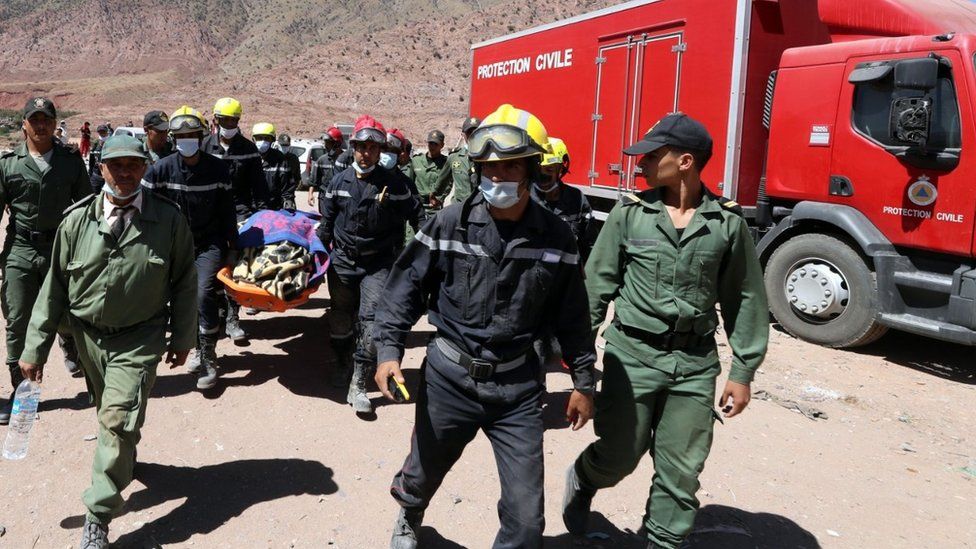Rescuers in Morocco have been using their bare hands as desperate search efforts continue for survivors of Friday’s powerful earthquake.
A total of 2,681 people are known to have died in the tremor – the country’s deadliest in 60 years.
Morocco’s government is under pressure to accept more international aid, as rescuers battle with exhaustion.
So far, it has accepted help from only four countries – Spain, the UK, Qatar and the United Arab Emirates.
The 6.8 magnitude tremor hit the High Atlas mountains south of Marrakesh, and destroyed many rural and remote villages.
One of them – Tafeghaghte – has had its population of 200 people nearly halved, and many are still missing.
Heavy lifting equipment is struggling to get through roads blocked by boulders and other debris.
In the village of Moulay Brahim, 26-year-old Said told the BBC that he saw his neighbour’s house collapse.
“A family of six people lived there. The father was outside at the time and is still alive, but his wife and four children were there and died,” he said, in a state of shock.
“The daughters were 15, eight and five years old. The last child was a little boy about to turn three” he explained.
Said has not been able to sleep or eat since Friday night.
“The situation is catastrophic. I don’t know how I will recover from this,” he said.
Tom Godfrey, the team lead for UK rescue charity EMT, said the worst impact is in the south-west, where humanitarian relief is desperately needed.
Speaking to the BBC en route the village of Amizmiz, he said his team are expecting to treat traumatic injuries initially, with the risk of disease increasing if aid is further delayed.
- ‘I had to choose to save my parents or my son’
- Why Morocco is wary of earthquake help from abroad
- Morocco earthquake movement mapped from space
The World Health Organization said more than 300,000 people have been affected by the disaster.
The Tinmel Mosque, a historic site in the mountains, has been severely damaged, and Marrakesh’s old city, a World Heritage Site has suffered collapsed buildings.
Pressure – and anger – is mounting on Morocco’s government to accept the help offered by several nations.
The United States, Tunisia, Turkey, Taiwan and France – a former colonial power of Morocco – are some of the nations which have offered support.
Neighbouring Algeria, which has a long history of fraught relations with Morocco, has offered specialised rescue workers, medical personnel and sniffer dogs, as well as beds, tents and blankets.
But the Moroccan government has said it does not want to risk a chaotic situation with dozens of countries and aid organisations arriving to help.
“A lack of co-ordination in such cases would be counterproductive,” authorities said.
Dr Clare McCaughey, a GP based in Marrakesh, told the BBC that private clinics like hers will not hesitate to “provide care to any earthquake victims free of charge”.
“Moroccans are doing what Moroccans do best,” she said, adding that it has been “incredible” to see the outpouring of support from the community.
“There are huge trucks going up to the mountains, but also people [taking their cars] to the supermarkets and getting them up the hill to the people”.
This video can not be played
